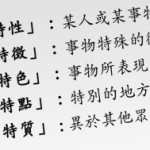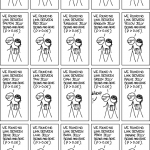Articles in the ‘Advanced’ category Page 30
-
Role-playing as a way to expand your Chinese
When learning a language, we naturally become very good at what we do often, but expanding our knowledge beyond our personal sphere of experience is an essential step to take. Role-playing is a useful tool that can be employed to take this step. Practice with a friend and create new situations or new persons, all depending on which area you feel you need to improve in.
Read → -
Dealing with near-synonyms in Chinese as an independent learner
Near-synonyms cause major headaches for language learners and it’s especially hard for Chinese learners due to the lack of adequate resources in English. This article suggests some ways of handling the problem of near-synonyms when learning Chinese.
Read → -
What research can and cannot tell us about learning Chinese
Most students don’t read scientific studies very often, but they might still encounter them in the mainstream press or when discussed online. Reading scientific papers isn’t easy, though, and if not careful, you might draw the wrong conclusions. This article is about how to read studies about learning Chinese.
Read → -
If you think spaced repetition software is a panacea you are wrong
Spaced repetition software (SRS) is widely discussed online, and generally speaking, there is a spectrum between people who think SRS is the holy grail of learning anything and those that think SRS is artificial, passive and just a waste of time. This article argues that this polarisation is a serious mistake, SRS is a tool and like any other tool, how we use it determines what we get from it.
Read → -
Learning how to learn Chinese through self-experimentation
Rigorous scientific research typically requires large sample sizes, otherwise it isn’t possible to draw any conclusions about the population at large, which is the goal of most studies. However, experimenting with yourself as the only participant might not be relevant for other learners, but it’s highly relevant for you. This article is about how to use self-experimentation to learn Chinese.
Read → -
Using Audacity to learn Chinese (speaking and listening)
Audacity is a marvellous piece of software that allows you to record audio (yourself, other people or whatever is playing on your computer), mimic native speakers, edit and enhance the audio, as well as automatically manipulate multiple files, such as lecture or lesson recordings. In short, Audacity is a really good program for learning languages. This article introduces the software both through a video example and explaining text.
Read → -
You might be too lazy to learn Chinese, but you’re not too old
Children learn languages neither quickly nor effortlessly, but there’s still a lot we can learn from them. You might be too lazy, but you’re definitely not too old to learn Chinese.
Read → -
Immersion at home or: Why you don’t have to go abroad to learn Chinese
You don’t have to go abroad to learn Chinese. The main difference between staying at home and going abroad is that it requires less effort to learn once you’re there (although it still requires quite a lot of effort). This means that you can learn Chinese at home, provided that you are determined enough and create an immersion environment yourself. This article gives suggestions and advice on how to achieve that.
Read → -
The question you have to ask about your Chinese teacher or course
The most important question you should ask yourself about your current teacher or course is what you won’t learn. Since this isn’t something most teachers and schools like to talk about, it’s typically something you need to figure out on your own. This article discusses this question from various angles, highlighting the importance of being aware of what you need to study on your own.
Read → -
Is your flashcard deck too big for your own good?
If you use spaced repetition software like Anki for learning Chinese and do so for a few years, you will end up with a very large flashcard deck. Some people advocate deleting the deck if it becomes too big. This article looks closer at the pros and cons of keeping large decks and why you might want to consider starting over from scratch.
Read →









